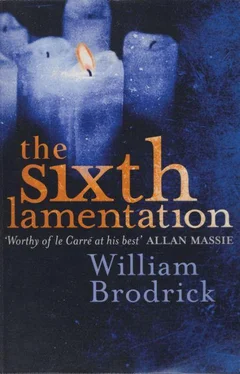William Brodrick - The Sixth Lamentation
Здесь есть возможность читать онлайн «William Brodrick - The Sixth Lamentation» весь текст электронной книги совершенно бесплатно (целиком полную версию без сокращений). В некоторых случаях можно слушать аудио, скачать через торрент в формате fb2 и присутствует краткое содержание. Жанр: Триллер, на английском языке. Описание произведения, (предисловие) а так же отзывы посетителей доступны на портале библиотеки ЛибКат.
- Название:The Sixth Lamentation
- Автор:
- Жанр:
- Год:неизвестен
- ISBN:нет данных
- Рейтинг книги:5 / 5. Голосов: 1
-
Избранное:Добавить в избранное
- Отзывы:
-
Ваша оценка:
- 100
- 1
- 2
- 3
- 4
- 5
The Sixth Lamentation: краткое содержание, описание и аннотация
Предлагаем к чтению аннотацию, описание, краткое содержание или предисловие (зависит от того, что написал сам автор книги «The Sixth Lamentation»). Если вы не нашли необходимую информацию о книге — напишите в комментариях, мы постараемся отыскать её.
The Sixth Lamentation — читать онлайн бесплатно полную книгу (весь текст) целиком
Ниже представлен текст книги, разбитый по страницам. Система сохранения места последней прочитанной страницы, позволяет с удобством читать онлайн бесплатно книгу «The Sixth Lamentation», без необходимости каждый раз заново искать на чём Вы остановились. Поставьте закладку, и сможете в любой момент перейти на страницу, на которой закончили чтение.
Интервал:
Закладка:
Agnes had a way of saying dreadful things with complete simplicity, as if she were commenting on the wallpaper. Unless one inhabited a similar inner landscape it was quite impossible to reply Even Lucy came up against these awful flashes of tranquillity, where one would expect to find anguish, when she could only look upon her grandmother from a distance with a sort of shocked reverence.
Outside the window rain began to fall, bouncing off the pavement, gathering the litter, washing stray cuttings from tidy gardens, and Agnes, serene, reached for the newspaper by her side, saying, ‘There’s a documentary tonight on The Round Table.’ She paused. ‘One of the contributors is Pascal Fougeres. I’m worried he might mention me… the family will not have forgotten…’ Her eyes reached out to Lucy. ‘You’ll have to stay ‘
‘All right then, if I must.’
‘You must.’
Lucy regarded her grandmother and became almost cold with apprehension. Impulsively, with sudden terror, she said, ‘Does it make any difference to you?’
Agnes looked up, mildly surprised, and said, ‘Of course it does.’
‘No, Gran,’ Lucy replied, squirming, prickling with intimacy, ‘I mean, does it matter that I’m not your own blood?’ She flushed hot; sweat tingled across her back and neck.
Agnes dropped the paper. With coruscating simplicity she said, ‘It has made you utterly irreplaceable.’
The documentary had been constructed in such a way as to follow the steps of Pascal Fougeres through a tragic moment in history. To her amazement, Lucy found her sensibilities dozing, sluggish, as she watched the footage of German soldiers surveying Paris with the lazy contentment of ownership. She could not rouse the naked fear they must have represented. Anodyne war films and comedies about silly Nazis had tamed them, even in Lucy’s eyes.
The narrator described how Fougeres, a foreign correspondent for Le Monde, had inadvertently come across a cryptic memo recently declassified in the United States. The document briefly reported the capture and release of a young German officer by British Intelligence. The journalist immediately recognised the name for it was Schwermann who had been responsible for the breaking of a Resistance network and the death of its leader — Pascal’s great-uncle, Jacques. The viewer was taken back to the time of Occupation, when Jacques, with other students, formed The Round Table. On the day the Star of David had become compulsory apparel, Jacques had worn his own star, marked ‘Catholique’, outside the Gestapo offices on Avenue Foch. He had been arrested and interned in Drancy for two weeks. But that had not discouraged the young protester.
‘The Round Table continued with its work,’ said Pascal, his face filling the screen, dark-eyed and pensive, ‘but it was broken by Schwermann within the month. They were all deported. None survived.’
Schwermann escaped from France after the war and made his way to England, along with a Frenchman, Victor Brionne, who had been based in the same department of the Gestapo. They did so under false identities that had never been discovered. All this, and no more, was set out in the terse memo the young journalist had been fortunate enough to find. He publicised his findings, expecting a strong reaction throughout Great Britain. It caused a brief outcry somewhere on the third or fourth pages and then became yesterday’s news. Attempts to trace Schwermann through official channels floundered. Meanwhile, back in France, a consortium of interested parties had been formed and the case against the fugitive Nazi was painstakingly constructed. The decisive breakthrough came when Pascal Fougeres received a letter, anonymous and tantalisingly brief, disclosing the false name under which Schwermann was hiding: Nightingale.
The narrator, interviewing Fougeres, asked about the Frenchman whose whereabouts were still unknown. Pascal replied, ‘Victor was Jacques’ best friend and, as with so many others, the war split them apart. He fled, I think, because he’d been trapped by circumstances. He was just an ordinary policeman but ended up at Avenue Foch.’ He smiled, as if cracking a joke: ‘I doubt whether it would have been a good idea to trade arguments with the Resistance after the Germans had gone.
As for Schwermann, said the narrator with a level voice, he had found sanctuary in a monastery.
Lucy turned off the television. It was dark outside and the rain was still falling, lightly but interminably She said, ‘You weren’t mentioned.’
‘No.’
‘I didn’t realise Jacques had been the one who set up The Round Table.’
‘That’s not how I remember it.
Lucy reflected further about Pascal Fougeres. ‘He’s got no idea what Victor Brionne did to you and Jacques… and the others.’
‘No,’ replied Agnes, distracted. She smoothed a wrinkle in the fabric on the arm of her chair. Her eyes narrowed as if trying to make out a figure in the dark, half seen, familiar but receding from view
‘I wonder who wrote that letter… giving the name?’
‘Yes, I wonder…’ Agnes stared into the shadows, still calmly smoothing the material.
Chapter Sixteen
1
Finding the whereabouts of Father Louis Chambray (for he had never been laicised) was a relatively straightforward matter. While a Gilbertine monk like Anselm, he belonged to a different Province, a French strain, which had nonetheless been founded as a result of Henry VIII’s delirious policy of closure that had removed the Gilbertines from English life. Remnants of the Order had sought refuge in Burgundy — mindful, perhaps, that its Dukes had once sold Joan of Arc to the English. Such courtesies promote lasting trust, a commodity the Gilbertines required if they were to survive. For whatever reason the characteristic double-houses (monks and nuns in separate buildings but joined for services on Sundays and feast days) thrived, notwithstanding the various anti-clerical movements that followed the feast of revolution two hundred years later. The French Order subsequently re-established an English presence at Larkwood Priory in the early 1 920s. After that there was little contact between the two Provinces, not least because each house was self-governing. But historic familiarity and a sort of religious entente cordiale helped Anselm’s purpose.
The French Gilbertines’ motherhouse in Rome freely supplied Anselm with details about Father Chambray, as they had evidently done on an earlier occasion to an emissary from the Vatican. Chambray kept in contact with his Order once a year, sending a Bonne Annee card to a Prior General he had never known. He’d gone, but that one slender tie remained.
‘Why’s he so popular all of a sudden?’ asked the plump archivist, chewing one of his fingernails.
‘Some ancient history, that’s all,’ replied Anselm.
‘History is never ancient,’ said the keeper of the books, blinking solemnly
‘Indeed,’ said Anselm dryly He wasn’t altogether fond of inversions. They tended to sound good and mean very little. He thanked the young sage, placed the address in his pocket and wandered back to San Giovanni’s. There was much to be done before returning to England.
Before directing his efforts to finding Victor Brionne, Anselm decided to follow the escape trail from Paris to Notre-Dame des Moineaux. Tracing history had its own poetic attraction, but geography and pride were the decisive factors: Chambray now lived in the capital, and since Anselm had to pass that way to reach the monastery he thought he might as well track down the one living survivor from the time. All the more so, coming to the pride, because Anselm considered himself particularly adept at handling individuals described as ‘uncooperative’. It had been his hallmark at the Bar. Back at San Giovanni’s, Anselm rang Father Andrew to explain matters and get the necessary permissions.
Читать дальшеИнтервал:
Закладка:
Похожие книги на «The Sixth Lamentation»
Представляем Вашему вниманию похожие книги на «The Sixth Lamentation» списком для выбора. Мы отобрали схожую по названию и смыслу литературу в надежде предоставить читателям больше вариантов отыскать новые, интересные, ещё непрочитанные произведения.
Обсуждение, отзывы о книге «The Sixth Lamentation» и просто собственные мнения читателей. Оставьте ваши комментарии, напишите, что Вы думаете о произведении, его смысле или главных героях. Укажите что конкретно понравилось, а что нет, и почему Вы так считаете.












